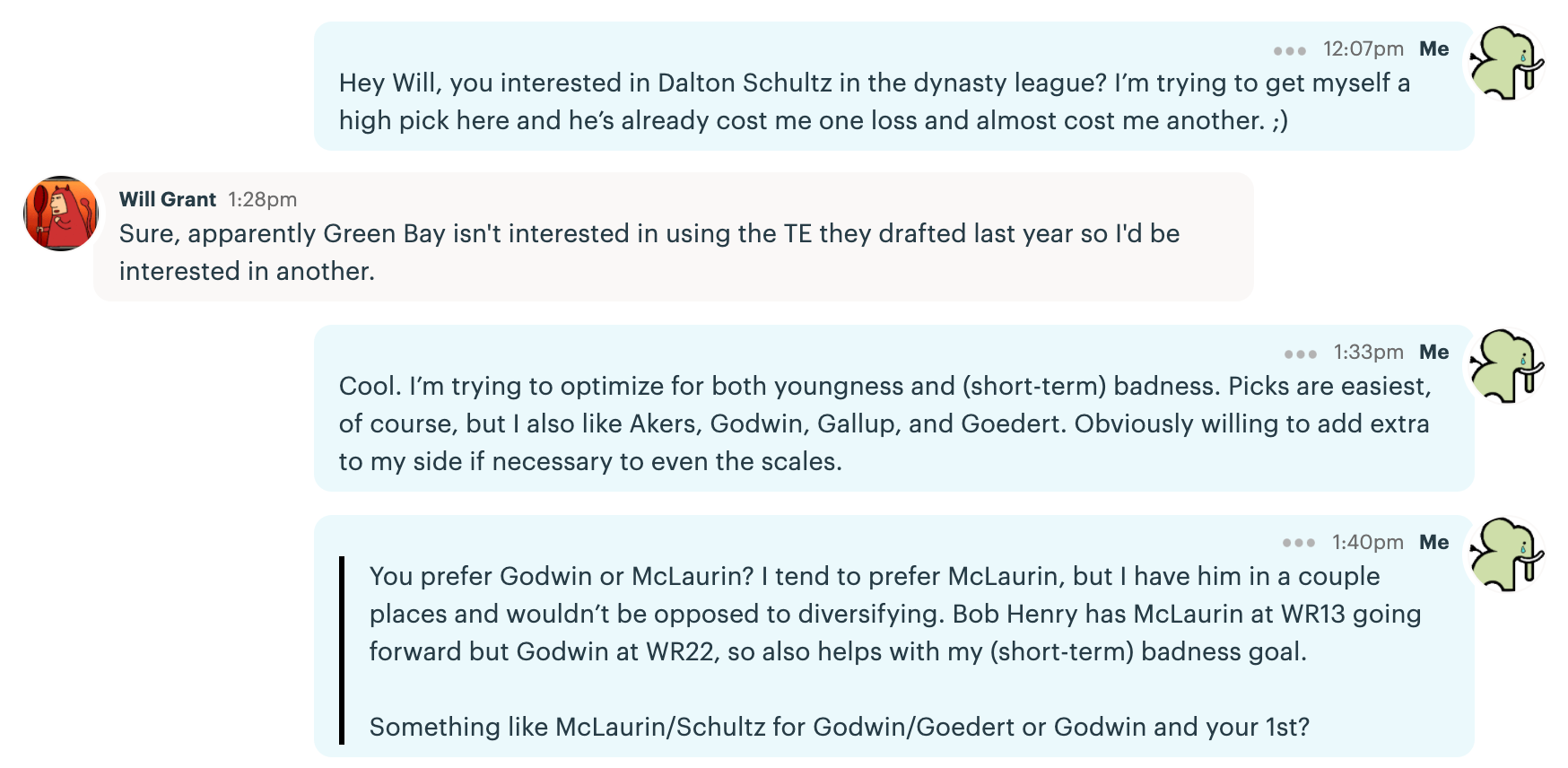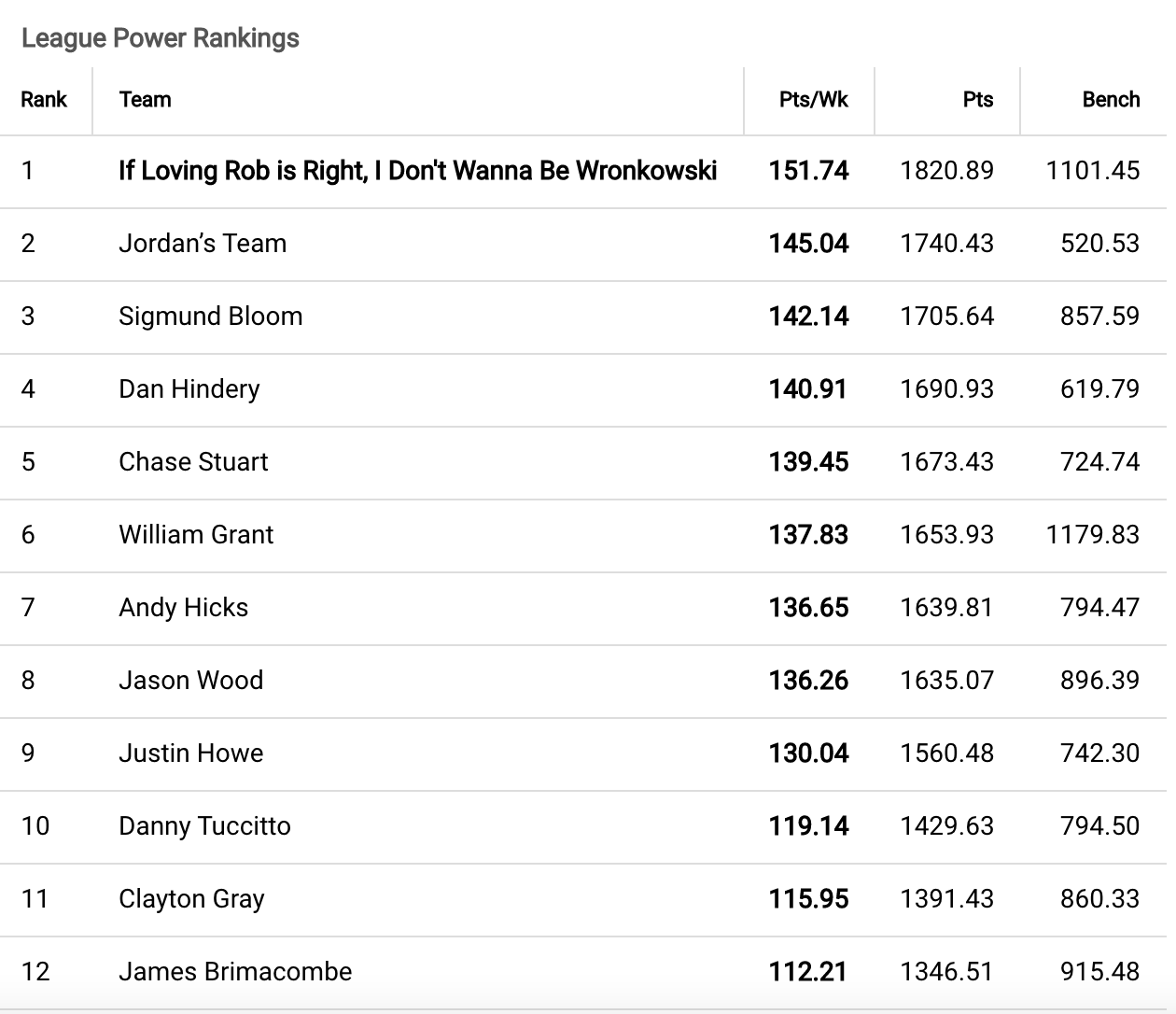Twitter is fun. Trying to explain detailed procedures in 140 character chunks is not. (Especially when the conversation involves multiple participants and @mentions alone are eating up a third of your allotment.)
I was discussing with Dwayne Brown (@DwayneB13), Eric Dickens (@DLFootball), and Ryan McDowell (@RyanMc23) my preferred waiver formats for dynasty leagues. Redraft leagues have historically used a waiver priority based on current standings that resets weekly. This system gives the most help to bad teams and can keep teams interested.
At the same time, many view it as too punitive to good teams. As an example, a team that led its league from wire to wire would have the last waiver pick every single week of the season. Many believe it’s unfair to punish someone for doing well.
Weekly resetting waivers also create some perverse incentives. I know teams that will deliberately lose their week 1 matchups because they figure the early-season waiver position is more valuable in the long run than one extra win.
As an alternative, something called FAAB has seen explosive growth in popularity in recent seasons. FAAB stands for Free Agent Auction Bucks, (I believe); under that system, every team is given a certain amount of “dollars”, and they can bid for free agents on waivers every week. Any dollars they do not use are saved for use later in the season.
FAAB has a big advantage over waivers: it is exquisitely fair. Every team has the exact same budget, every team faces the exact same choices on whether to bid or whether to save. If a team does poorly on waivers, the owner has no one to blame but him- or herself.
This exquisite fairness has made it perhaps the most popular system in dynasty, where waivers can play a far more crucial role. The team who scooped Anquan Boldin off of waivers in redraft had an advantage for the 2003 season. The team that did so in dynasty is still seeing rewards from that move.
Because gains are persistent for years, it’s important that every team have an equal shot at talent on the waiver wire. And truthfully, there is no system more fair than a free agent auction.
But there is a system that I prefer; it is *almost* as fair, and any extra unfairness it brings is, in my opinion, a distinct advantage. I prefer persistent waiver priority.
Persistent waiver priority behaves much like the weekly-resetting variety. Everyone submits a claim, the owner with the highest claim gets his player, and his or her priority is then sent to the back of the queue. But unlike weekly resetting priority, waiver order remains constant from week to week and season to season. You only move up when people in front of you make a claim, sending themselves to the back of the line.
In effect, this turns waiver priority from a “use it or lose it” asset to a very strategic decision. Let’s say that I have #1 waiver priority, and there’s a pretty good prospect on the street right now. I can use my priority to take the bird in the hand… or I can opt to save it and hope a better prospect is on the street down the road.
Similarly, if I have the #3 waiver priority, I can go after that pretty good prospect, or I can hope that the #1 or #2 priority will use theirs this week and I can rise in the queue.
Or I can opt to not save my priority at all; I can use it at every opportunity, consigning me to the back half of the order and denying me any chance at a true breakout prospect, but hopefully making up for it in the sheer volume of moves I make.
This “use it or save it” decision mirrors the one that faces FAAB owners. And after persistent waivers have been around for a while, they become perfectly fair for the same reasons FAAB is; everyone had the same choice of using or holding.
The one “problem” with persistent waiver priority, really, is the initial setup. There is no way to do that in a perfectly fair manner. The person who starts the league with #1 priority has an advantage over the person who starts the league with #12 priority.
I put “problem” in quotes here, though, because in my mind, the unfairness is an advantage. Because startup drafts are unfair, too! I wrote earlier this year about how player value follows a power law distribution. This means that the gaps at the top are bigger than the gaps further down.
What this means is that the dropoff from pick #1 to pick #2 is greater than the dropoff from pick 23 to pick 24. And the dropoff from pick 25 to pick 26 is greater than the dropoff from pick 47 to pick 48. Or, in other words, the owner with pick 1.01 should expect to leave the draft with more value than the owner with pick 1.02.
How much more? I took last week’s dynasty value charts and calculated, if every owner drafted straight down the list, how much value they would wind up with at the end. Here are the results:
Pick 1 – 2910.0
Pick 2 – 2771.2
Pick 3 – 2690.8
Pick 4 – 2696.2
Pick 5 – 2679.0
Pick 6 – 2743.3
Pick 7 – 2721.0
Pick 8 – 2717.7
Pick 9 – 2667.0
Pick 10 – 2647.1
Pick 11 – 2623.8
Pick 12 – 2615.1
It’s not a perfectly even dropoff, (and the exact values will vary from week to week and year to year depending on where the tier breaks fall), but there is a very strong negative correlation between draft position and total value. (For those curious, the correlation is -0.786.)
So the guys and gals at the top of the draft order have an unfair advantage over the guys and gals at the bottom of the order. How can we counteract this? Hey, remember that bit about the initial waiver order being unfair? Yeah, just assign waiver priority in the reverse order of startup draft position. That gives the later drafters a small short-term advantage that lasts maybe half a season before it washes out and persistent waiver priority becomes as exquisitely fair as FAAB.
Now, if you like FAAB, I’m not saying it’s a bad system. It’s a fine system. In fact, it fits really well philosophically and aesthetically in leagues that run a startup auction instead of a draft. Those leagues are making a commitment to fairness at the outset, (and also signalling a love of bidding).
But in leagues that run their startup as a draft, why should they run waivers as an auction? Persistent waiver priority maintains the draft-like feel, helps offset some of the initial unfairness, and is a quicker, easier, and lower-maintenance method of assigning free agents for years to come.

